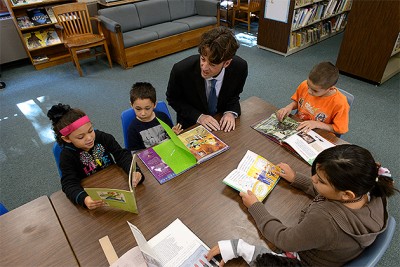
Connecticut has some of the nationʼs worst disparities when it comes to the reading performance of low-income students compared to their more affluent peers, but an innovative new initiative coordinated by the University of Connecticutʼs Neag School of Education aims to study and change that.
Launching this fall, the CT K-3 Literacy Initiative (CK3LI) will support schools in implementing research-grounded practices to improve the reading abilities of children in kindergarten through third grade, a crucial time for developing strong literacy skills.
The initiative, announced in August by Gov. Dannel P. Malloy as part of the Stateʼs Education Reform to improve overall outcomes, was developed by the General Assemblyʼs Black and Puerto Rican Caucus. The initiative is based on research gathered in 2011 through a study funded by the Grossman Family Foundation promoting best practices in early literacy and closing the academic achievement gaps. Literacy How conducted the study in 15 Connecticut schools that showed the importance of proper reading assessment tools, timely interventions, well trained teachers and
coaches, and school leaders who make reading a priority. The Commission on Children also participated, teaching parents how children learn to read and what they can do at home and in school to bolster reading.
“If kids are reading well by the end of first grade, thereʼs an 80 to 90 percent chance theyʼll continue to read well,” said Neag School professor Michael Coyne, whoʼs overseeing the initiative along with fellow Neag professor George Sugai. Both are researchers in the Center for Behavioral Education and Research. “Unfortunately, the flip side is also true: we know that if students arenʼt reading well by the end of first grade, thereʼs an 80 to 90 percent chance theyʼll continue to struggle with reading.”
This expanded initiative commits $1.77 million in funding to support 25 new reading interventionist and literacy coach positions at five more schools selected in September through a competitive process, and showing a demonstrated commitment to improving reading outcomes. Each of the five elementary schools will have a literacy coach and four reading interventionists who will help adapt existing effective programs, develop new instructional methods, tailor lessons to individual student needs, and gather data to document student progress and implementation fidelity or accuracy. Each child not reading at proficiency will receive an individualized reading intervention plan. Parents will be informed and engaged as authentic partners. The Neag team will be supported by Hill for Literacy researchers in coordinating the initiative in the five schools.
Another important CK3LI objective is to give existing school and district staff the tools and strategies to continue to use methods and strategies that prove to be effective in improving reading skills.
“Itʼs so exciting that thereʼs real commitment to this initiative at the state level,” Coyne said. “This is going to enable us to focus resources and intervention efforts on those kids who need them the most.”
The five schools that will be participating in the CK3LI initiative are:
Ann E. Norris Elementary School in East Hartford Latino Studies Academy at Burns School in Hartford John Barry Elementary School in Meriden Truman Elementary School in New Haven Windham Center Elementary School in Windham
The state will increase that number by five schools per year. Among the responsibilities that the schools accepted as part of the CK3LI initiative are a commitment to providing students with uninterrupted reading instruction, access to evidence-based small group intervention strategies, and the creation of literacy teams that will meet regularly to examine studentsʼ progress and plan and adjust instruction. School and district administrators have committed time and priority to CK3LI implementation so that students, parents, and teachers will truly benefit from this unique opportunity.
In addition to intensive interventions at the five selected schools, the law also requires major statewide reforms, including a coordinated state-wide reading plan to bring consistency and quality to the way reading is taught across the state; reading instruction based on science; reducing the disproportionate and inappropriate ID of minority students as Special Ed.; professional development in reading for teachers and administrators; incentives for schools that improve their reading performance trend; and recommendations for a proven reading assessment tool that helps identify the specific individualized learning needs of early readers, K-3. The UConn Team will also be assisting with these important initiatives.
“There is compelling evidence that an intensive focus on literacy, particularly for those
identified as struggling early readers, can have a dramatic impact on a childʼs future school success,” said Connecticut Education Commissioner Stefan Pryor in a statement. “The General Assembly, particularly members of the Black and Puerto Rican Caucus, deserves great credit for making early reading a priority as part of education reform this year. We look forward to building on this commitment.”
Right now, Coyne said the focus is on making sure the program is up and running at the five participating schools, but heʼs hopeful the initiative will provide the evidence and framework for an effective literacy approach that can take root in other schools.
In the end, all CT students will benefit from this unique effort; however, students who are at greatest academic risk will be experiencing an unprecedented opportunity to become successful readers.
 Facebook
Facebook
 Twitter
Twitter
 LinkedIn
LinkedIn
